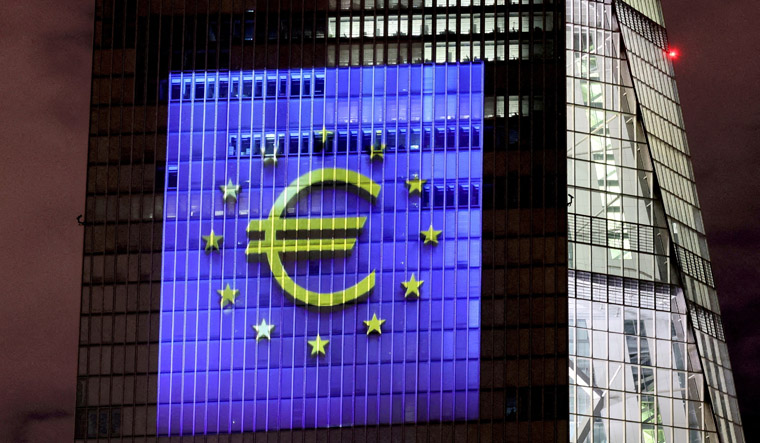The European Central Bank raised interest rates on Thursday, for the first time in 11 years by a larger-than-expected amount, joining steps already taken by the US Federal Reserve and other major central banks to target stubbornly high inflation.
The ECB's surprise hike of half a percentage point for the 19 countries using the euro currency is expected to be followed by another increase in September, possibly of another half-point. Bank President Christine Lagarde had indicated a quarter-point hike last month, when inflation hit a record 8.6 per cent.
She said the bigger hike was unanimous as inflation continues to be undesirably high and is expected to remain above our target for some time. As the bank leaves an era of negative interest rates, Lagarde said economic forecasts don't point to a recession this year or next but she acknowledged the uncertainty ahead.
Economic activity is slowing. Russia's unjustified aggression towards Ukraine is an ongoing drag on growth, the ECB chief said at a news conference. Higher inflation, supply constraints and uncertainty are significantly clouding the outlook for the second half of 2022 and beyond.
The ECB made the bigger-than-expected increase to underline its determination to get inflation under control after its late start, said Carsten Brzeski, chief eurozone economist at ING bank. The move aims to restore the ECB's damaged reputation and credibility as an inflation fighter.
Today's decision shows that the ECB is more concerned about this credibility than about being predictable, Brzeski said. Recession concerns have helped push the euro to a 20-year low against the dollar, which adds to the ECB's task by worsening energy prices that are driving inflation. That is because oil is priced in dollars.
Raising rates is seen as the standard cure for excessive inflation. The ECB's benchmarks affect how much it costs banks to borrow and so help determine what they charge to lend. But by making credit harder to get, rate increases can slow economic growth, a major conundrum for the ECB as well as for the Federal Reserve.
The Fed raised rates by an outsized three-quarters of a point in June and could do so again at its next meeting. The Bank of England started the march higher in December, and even Switzerland's central bank surprised with its first increase in nearly 15 years last month.
The European economy has the added worry of a potential cut-off of Russian natural gas, which is used to generate electricity, heat homes and fuel energy-intensive industries such as steel, glassmaking and agriculture. Even without a total cut-off, Russia has steadily dialled back gas flows, with EU leaders accusing the Kremlin of using gas to pressure countries over sanctions and support for Ukraine.
Europe's central bank hikes interest rates to control inflation
Interest rate hiked for the first time in 11 years
PTI
Updated: July 22, 2022 09:28 IST
 (File) An illumination on the facade of European Central Bank |Reuters
(File) An illumination on the facade of European Central Bank |Reuters
also read
- Normal monsoon predicted for 2024. Is it enough to bring down inflation?
- With inflation likely to cool and growth strong, shallow rate cuts likely in the second half of FY25
- Inflation has slid again in Europe. What does this mean for interest rates?
- Retail inflation at 5.09 per cent in February, almost unchanged from January
TAGS
📣 The Week is now on Telegram. Click here to join our channel (@TheWeekmagazine) and stay updated with the latest headlines
read more
-

'No missile attack in Isfahan': Iran says blasts caused by activated air defence systems
-

Video of Hyderabad BJP candidate Madhavi Latha 'shooting arrow' at mosque causes controversy
-

Gurinder Chadha announces new film 'Christmas Karma', Kunal Nayyar to play lead role
-

Mumbai Indians Captain Hardik Pandya faces Rs 12 lakh fine for slow over rate against Punjab Kings
-

The power of shared humanity: Uniting for global progress
*Articles appearing as INFOCUS/THE WEEK FOCUS are marketing initiatives


